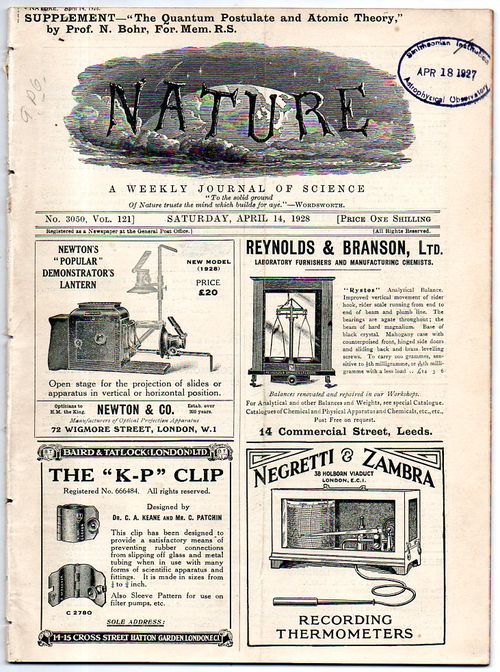"The very nature of the quantum theory thus forces us to regard the space-time co-ordination and the claim of causality, the union of which characterizes the classical theories, as complementary but exclusive features of the description"--Niels BohrCollected Works, edited by E. Rüdinger. vol. 6: The Foundation of Quantum Physics, (1926–1932), edited by J. Kalckar, page 115.
Bohr, Niels. "The Quantum Postulate". In: Nature, vol. 121, no. 3050, pp. 580-590, April 14, 1928. with the original front wrapper, removed from a larger bound volume. Provenance: Smithsonian Institution Libraries. Very good copy. $1250

First publication in English (though it was pubished virytually at the same time in German and French) of Bohr's
"complementarity" lecture on the state of quantum mechanics
presented at the Volta Conference at Lake Como, Italy (1927). This was the first Volta Conference (others would follow, yearly, from 1932-1935, in different subject areas) and was entitled the International Conference on Physics, sponsored by the Royal Academy of Science in Rome, and funded by the Alessandro Volta Foundation, and was held in 1927.
"From 11th to 20th September 1927 in Como, an International Conference on Physics was held to commemorate the 100th anniversary of the death of Alessandro Volta. Niels Bohr presented his idea of complementarity to an illustrious gathering. In the discussion, Max Born, Hendrik Kramers, Werner Heisenberg, Enrico Fermi and Wolfgang Pauli gave their comments on his paper."--ETH Bibliothek, here.
Five weeks later was the Fifth Solvay Conference, another enormous powerhouse of a meeting of the world's leading physicists, and one particularly known for the discussion bteween Bohr and Einstein on the Copenhagen Iterpretation of quantum mechanics:
"The discussions between Bohr and Einstein dominated the conference and although Einstein could not be convinced that the new interpretation of the quantum theory was satisfactory in all respects, Einstein finally had to admit that it was self-consistent and free from contradictions. Pauli also contributed decisively to the results of this conference, in which he frequently rose to speak".--ETH Bibliothek, here.
From the Dictionary of Scientific Biography:
"From the epistemological point of view, the discovery of the new type of logical relationship that complementarity represents is a major advance that radically changes our whole view of the role and meaning of science. In contrast with the nineteenth-century ideal of a description of the phenomena from which every reference to their observation would be eliminated, we have the much wider and truer prospect of an account of the phenomena in which due regard is paid to the conditions under which they can actually be observed - thereby securing the full objectivity of the description" --DSB, pp 249-250




Comments